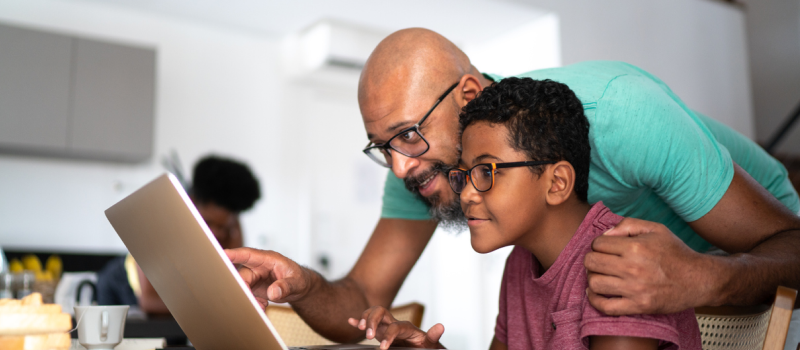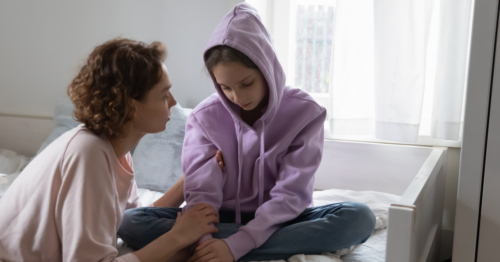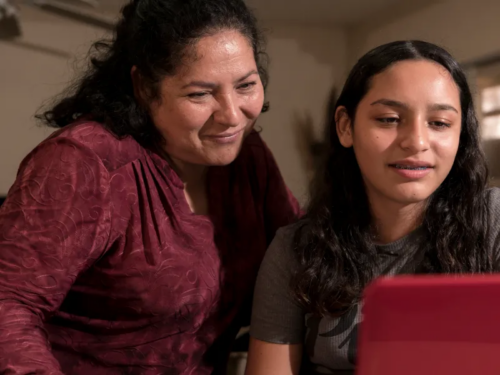
Table of Contents
Why is Teen Family Therapy Important?

Written By: Dr. Rasna Kaur Neelam

Clinically Reviewed By: Dr. Don Gasparini
June 22, 2023
6 min.
Family therapy is a type of therapy that helps families—including but not limited to biological families, extended families, and chosen families—communicate and solve problems. In this article, we learn more about teen family therapy and discuss how it is incorporated into Charlie Health programming.
Learn more about our Clinical Review Process
Table of Contents
What is teen family therapy?
Family therapy is a type of psychological counseling that is designed to help families communicate and solve conflicts. The term “family” in family therapy can be broadly defined, though, and is not limited to biological families alone. It can include various types of relationships and group systems, including extended families, adult children, or even close-knit groups of people—like roommates or friend groups—who consider themselves family.
Family therapy usually involves working with multiple members of a family unit, but it can also involve sessions with specific family members. “Teen family therapy,” the term we will often use throughout this article, involves the family and loved ones of teenagers or young adults.
For what conditions can teen family therapy be used?
There is no reason “too small” to seek family therapy. A transition period or stressful time might be why some families seek therapy, whereas others might use the therapy to process loss or divorce. Additionally, almost any mental health condition that an individual in the family is facing can be a reason to look for a family therapist.
Charlie Health’s Chief Clinical Officer, Dr. Caroline Fenkel LCSW, said in an interview that depression, anxiety, self-harm, suicidal ideation, technology addiction, and behavioral issues are just a few examples of why people might start family therapy.
Even though a specific family member may be the one facing a mental health condition, Torre explained that often the whole family system struggles with the diagnosis. It’s impossible to separate or isolate what one individual is going through from their family, as that person’s mental health also impacts their loved ones.
At Charlie Health, when a teenager or young adult enrolls in our Intensive Outpatient Program (IOP), family members are highly encouraged to participate in treatment. Family therapy occurs in conjunction with individual therapy, intensive groups, and other supportive measures, such as free family support groups.

Help your family start the healing journey today.
Evidence-based care from home.
Why is teen family therapy important?
Family therapy can result in a number of benefits for each individual in the family. Some of these benefits include.
Preventing and early intervention of problems: Teen family therapy can help families navigate mental health concerns, explosive arguments, drug abuse, and more before they get worse. It is best to seek help as soon as a problem arises as a preventative measure instead of after irreversible damage has already happened.
Navigating teenage development: Teenage years can be challenging for teens and parents alike. To help navigate all the changes that come with teenage years – changes to one’s body and emotions, shifting friend dynamics, increased autonomy – speaking with a therapist as a family can be helpful.
Improving a sense of connectedness: Having a designated time and place for families to come together to share emotions, work through disagreements, and learn to communicate helps improve that family’s connectedness. It also can increase trust among family members and foster empathy.
Reconnecting after periods of estrangement: Perhaps it has been several years since a parent, sibling, or loved one has been in contact with a teenager. Reconnecting after such a long period away can be challenging and specific to the needs of the family. Family therapy can help guide this transition.
Allowing for better communication: One of the major skill sets practiced is improved communication. Positive, effective, and clear communication is a skill that could last a lifetime and be passed down to future generations. By helping individuals from different generations understand each other’s struggles, everyone can become closer, thus creating a more positive environment.
Allowing for forgiveness: Oftentimes, families are stuck in arguments that occurred decades ago. While the details of the misgivings may be forgotten, feelings of anger and mistrust remain. Family therapy may be a way for families to forgive one another, a change that could have a significant positive effect on teens or children growing up in this family.

How are these goals met?
One of the ways that family therapy can achieve the above goals is by helping families work on and refine skills they can use outside of sessions. Specific skills learned in family therapy can include:
- Setting healthy boundaries and respecting the boundaries that others set
- Improving communication that occurs during disagreements or conflicts
- Discussing better problem-solving
- Working on processing emotions
- Understanding better how to calm down when family members are angry or frustrated with one another
- Learning how to actively listen to others
- Understanding that others are facing their own struggles
Join the Charlie Health Library
Get mental health updates, research, insights, and resources directly to your inbox.
You can unsubscribe anytime.
What does family therapy at Charlie Health look like?
At Charlie Health, family members of the teen or young adult enrolled in our IOP are encouraged to participate in therapy together for a one-hour virtual session weekly.
In addition to family therapy sessions, the individual enrolled in the Charlie Health IOP will also participate in individual therapy and therapy with peers. The program lasts for about 2-3 months in total.
Who can participate in family therapy? Parents, siblings, romantic partners, friends, grandparents, adult caretakers or guardians, or anyone else who can help and emotionally support the young person in IOP are welcome and asked to join.
Family members are not required to join each session. For example, a few sessions may be dedicated to working with parents, others may focus on the client’s relationship with their siblings, and others still may focus on the client’s romantic relationship. The specific details of involvement will depend on your therapist.
Charlie Health also offers free support groups for family and friends who have a loved one enrolled in IOP. These groups are a chance for caregivers of our clients to get support from other families, learn communication skills, and practice self-care.
What happens after family therapy is finished?
Unlike individual therapy, which can continue for several years or even indefinitely, family therapy is usually a short-term form of therapy used by families going through stress, making big decisions, navigating changing family dynamics or working through mental health challenges.
At Charlie Health, planning for a successful discharge or transition begins as soon as an individual starts IOP. To do this, the family therapist begins to think about how skills learned in therapy including strong communication, empathy, and problem-solving techniques—can be used at home once therapy ends. A few ways these skills can be used at home include the following:
- Establishing regular family check-ins so that there is a dedicated time and space for family members to express their feelings
- Practicing effective communication learned in therapy at home and taking a step back when you find yourself not communicating effectively or with empathy
- Coming up with a list of ways to manage emotions in a healthy way (journaling, art, exercise, etc.) and refer to that list when self-care is needed
- Scheduling family therapy sessions as needed to check in with a professional and correct any areas where you have strayed from your original plan
- Joining support groups or one-on-one therapy when appropriate. For example, if you are the sibling of a teenager struggling with drug use, finding a support group of your peers or a therapist who understands what you are going through may help you be a better and more empathetic sibling
- Reinforcing positive interactions. Thank those around you when they listen, show empathy, or correct negative behaviors
How to get started at Charlie Health
If someone in your family is struggling with their mental health and is interested in learning about Charlie Health – which includes one-on-one therapy, family therapy, and personalized groups with peers, click here.
We’re available 24/7 to help you get started.




